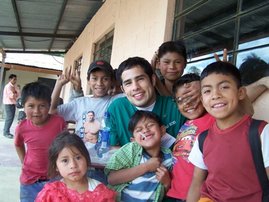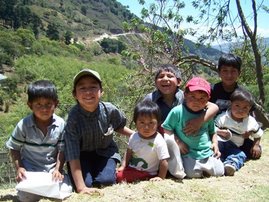The team’s last full day in Guatemala dawned clear and sunny. For the last time, the majority of the team gathered outside the Hotel Centro Colonial Antigua and piled into the two vans that would make the trip through the winding mountain roads to El Hato.

Only those working with the medical and dental clinics returned to El Hato for the final day; the electrical team would travel independently and finally get to try their hands at working on wiring a home, after spending the bulk of the week trying to restore the power to the Vuelta Grande buildings. The water project was effectively on hold for this particular trip – this being an election year in Guatemala, the government is showing increased interest in rural projects. Kathy Futornick, leader of the water project, found she could do little more than simply survey the progress of her water improvement and purification efforts, as even taking samples was made more difficult under the government’s watchful eye.
But the medical and dental clinics carried on. The courtyard was a flurry of children, some awaiting time with a doctor or dentist, but all hoping desperately for a gift.

Maureen Gonzales and Jill Methven did not join the team in El Hato. The previous day Maureen, a physical therapist, had stayed in Antigua to go to Transitions and offer some physical therapy. Transitions is an organization offering rehabilitation to disabled Guatemalans by providing wheelchairs and prosthetics. The organization also provides education and vocational training, and has worked closely with the Newberg Noon Rotary’s projects to make them possible.
Last year the Rotary team offered a dental clinic at the Transitions facility for one day, and Maureen found herself providing physical therapy to a handful of participants. This year, Maureen returned to Transitions independent of the Rotary dental clinic to provide more therapy.
And so while the medical and dental clinics were wrapping up in El Hato, Maureen opted to continue providing physical therapy. She and Jill went to a small school for disabled children in a neighboring village – which they learned of through Transitions, but is not formally connected.
“The kids were there for everything from spina bifida, polio, blindness, attention deficit, and cerebral palsy,” Maureen wrote in an e-mail home. She worked with the kids to find specific exercise programs for them, for example, doing yoga with four little girls to help them calm down.
“There was a lot of giggling but they were very eager to cooperate,” Maureen wrote. “It was very cute.”
Maureen also worked with a young polio patient who was walking using Lofstrand crutches, the kind that brace around a patient’s forearms. She found his strength was fine, but his balance was making the crutches necessary. Maureen ran him through a gamut of exercises, including work on a floor mat and “stepping strategies.”
“Finally we walked without the crutches,” but with some physical contact from someone to help maintain his balance, Maureen wrote. “His father was at the classroom, and he was so excited for his son. It was really wonderful.”
 While Maureen stretched and rolled her patients around on floor mats, Jill performed a manual therapy technique called a nerve assist. The process works much like a massage and aims at smoothing out pent-up waves of energy in the body’s nervous system. Working along the spine and the major branches off the spinal column, the nerve assist can alleviate problems with the spine as well as joints.
While Maureen stretched and rolled her patients around on floor mats, Jill performed a manual therapy technique called a nerve assist. The process works much like a massage and aims at smoothing out pent-up waves of energy in the body’s nervous system. Working along the spine and the major branches off the spinal column, the nerve assist can alleviate problems with the spine as well as joints.
Jill had been performing the nerve assists to a variety of patients all week long, and had taught the technique to a few of the other team members – including Alia Paquette, who had performed an assist on Antigua Rotary member Jacques Dallies when he’d visited in Vuelta Grande (pictured).
Back up in El Hato the medical and dental clinics saw a steady stream of patients, more than the day before. The dental students, Ben Gonzales and Mike Harper, had both been performing extractions throughout the week, but on this the last day they also got to try their hands at fillings.
“I’m a man now,” Ben announced after filling his first cavity.
By three o’clock in the afternoon both the medical and dental clinics started packing up all their supplies into heavy duty plastic tote boxes, and within an hour the school rooms were emptied. Team members lingered in the courtyard to say “adios” and snap a few last pictures of their young Guatemalan friends before piling once again into the vans and returning for the final time to Antigua.

Only those working with the medical and dental clinics returned to El Hato for the final day; the electrical team would travel independently and finally get to try their hands at working on wiring a home, after spending the bulk of the week trying to restore the power to the Vuelta Grande buildings. The water project was effectively on hold for this particular trip – this being an election year in Guatemala, the government is showing increased interest in rural projects. Kathy Futornick, leader of the water project, found she could do little more than simply survey the progress of her water improvement and purification efforts, as even taking samples was made more difficult under the government’s watchful eye.
But the medical and dental clinics carried on. The courtyard was a flurry of children, some awaiting time with a doctor or dentist, but all hoping desperately for a gift.

Maureen Gonzales and Jill Methven did not join the team in El Hato. The previous day Maureen, a physical therapist, had stayed in Antigua to go to Transitions and offer some physical therapy. Transitions is an organization offering rehabilitation to disabled Guatemalans by providing wheelchairs and prosthetics. The organization also provides education and vocational training, and has worked closely with the Newberg Noon Rotary’s projects to make them possible.
Last year the Rotary team offered a dental clinic at the Transitions facility for one day, and Maureen found herself providing physical therapy to a handful of participants. This year, Maureen returned to Transitions independent of the Rotary dental clinic to provide more therapy.
And so while the medical and dental clinics were wrapping up in El Hato, Maureen opted to continue providing physical therapy. She and Jill went to a small school for disabled children in a neighboring village – which they learned of through Transitions, but is not formally connected.
“The kids were there for everything from spina bifida, polio, blindness, attention deficit, and cerebral palsy,” Maureen wrote in an e-mail home. She worked with the kids to find specific exercise programs for them, for example, doing yoga with four little girls to help them calm down.
“There was a lot of giggling but they were very eager to cooperate,” Maureen wrote. “It was very cute.”
Maureen also worked with a young polio patient who was walking using Lofstrand crutches, the kind that brace around a patient’s forearms. She found his strength was fine, but his balance was making the crutches necessary. Maureen ran him through a gamut of exercises, including work on a floor mat and “stepping strategies.”
“Finally we walked without the crutches,” but with some physical contact from someone to help maintain his balance, Maureen wrote. “His father was at the classroom, and he was so excited for his son. It was really wonderful.”
 While Maureen stretched and rolled her patients around on floor mats, Jill performed a manual therapy technique called a nerve assist. The process works much like a massage and aims at smoothing out pent-up waves of energy in the body’s nervous system. Working along the spine and the major branches off the spinal column, the nerve assist can alleviate problems with the spine as well as joints.
While Maureen stretched and rolled her patients around on floor mats, Jill performed a manual therapy technique called a nerve assist. The process works much like a massage and aims at smoothing out pent-up waves of energy in the body’s nervous system. Working along the spine and the major branches off the spinal column, the nerve assist can alleviate problems with the spine as well as joints.Jill had been performing the nerve assists to a variety of patients all week long, and had taught the technique to a few of the other team members – including Alia Paquette, who had performed an assist on Antigua Rotary member Jacques Dallies when he’d visited in Vuelta Grande (pictured).
Back up in El Hato the medical and dental clinics saw a steady stream of patients, more than the day before. The dental students, Ben Gonzales and Mike Harper, had both been performing extractions throughout the week, but on this the last day they also got to try their hands at fillings.
“I’m a man now,” Ben announced after filling his first cavity.

By three o’clock in the afternoon both the medical and dental clinics started packing up all their supplies into heavy duty plastic tote boxes, and within an hour the school rooms were emptied. Team members lingered in the courtyard to say “adios” and snap a few last pictures of their young Guatemalan friends before piling once again into the vans and returning for the final time to Antigua.





No comments:
Post a Comment